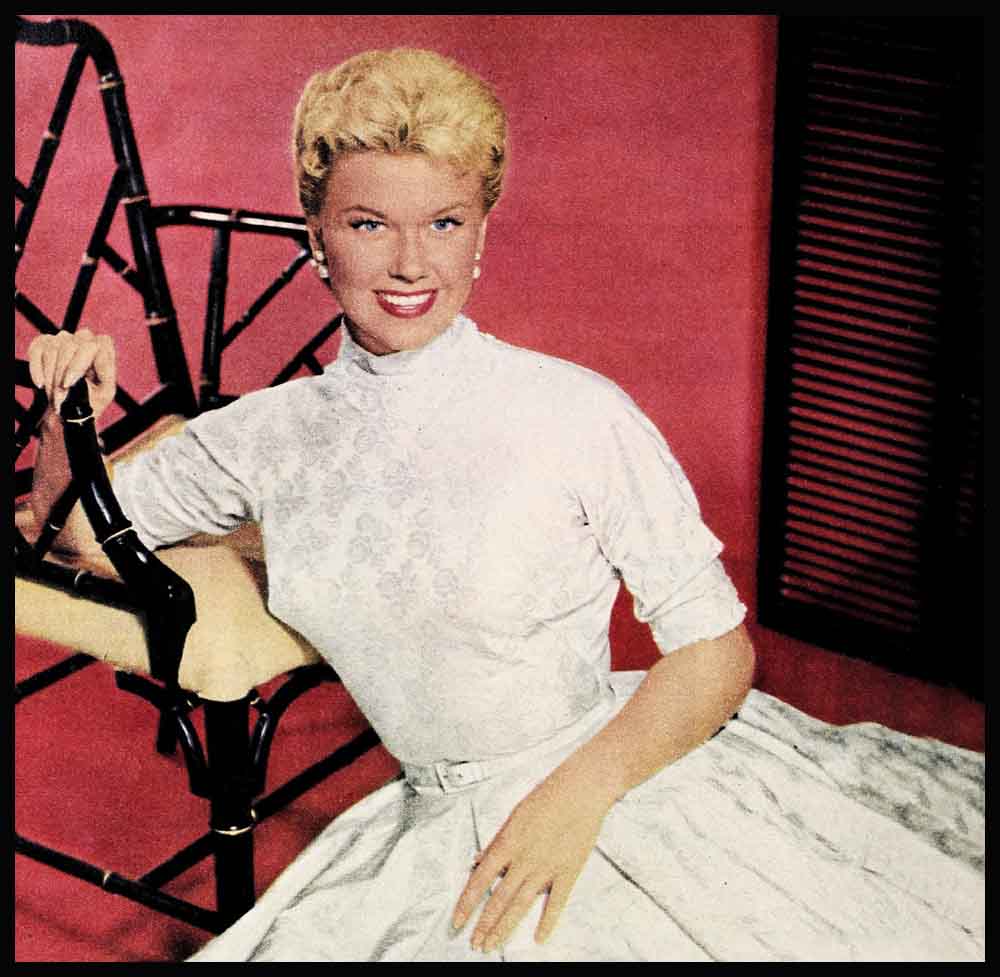
Atom Blonde!
It was a spring day, and the bedroom seemed cozy and warm as the late afternoon sun came into the room. And the little blond-haired girl, who sat quietly by the window watching the flock of birds singing on the large oak tree outside her window, forgot all about the cast on her leg and the many months she’d spent in bed.
It was spring and the birds were singing. She liked all kinds of songs and all kinds of music, even more so since she became ill. And slowly, unaware, she began humming softly to herself, “Embrace me. my sweet embraceable you. . . .” Before long she was singing the words softly, hardly above a whisper, so her father wouldn’t hear her. He didn’t approve of such music.
And yet, somehow when she sang, everything seemed better. Not that she didn’t see her father’s point of view. There wasn’t much music in such a song, at least not the kind of music a conservatory teacher with the name of Wilhelm Kapplehoff, who loved Bach and Beethoven and Brahms, would like.
But then. her father wasn’t in his teens; he probably couldn’t even remember how it was to be young. And how could he know how it was to be unable to walk, not to go outdoors. not to go to school? Perhaps love songs didn’t mean anything when you got older, but when you’re in your teens. love’s important. She hadn’t forgotten love even though she’d been cooped-up for ten long months waiting for her broken leg to heal. She couldn’t explain to her dad how singing these love songs made her forget the nightmares which haunted her sleep. She’d go to sleep, then start up, screaming, dreaming that, once again, she saw that freight train bearing down upon the car carrying her and the other three kids. As she screamed, her father would thunder out at her from the next room, “Doke, you go back to sleep.” Trembling, she’d obediently huddle silently under the covers, knowing that presently her mother would steal in to comfort her.
However, she wasn’t going to think of this much longer. On this exquisite spring day, she would cheer herself with the sure knowledge that very soon she’d be out again, with the other kids, going down to the ballroom to listen to that wonderful band leader with the curly hair who had played and whom she adored. Or she’d be going out on the scrimmage field to watch the boys try out, and maybe that brown-eyed fellow with the broad shoulders would be there and maybe this time he’d smile at her, even if he was three whole years older than she.
And of course she’d see Jerry Doherty. Why, by June, she and Jerry could certainly go out on the road again, the very day school closed. Five hundred dollar prizes here in Cincinnati they’d won when they were a mere fourteen. But now . . .
She stopped, electrified with her dream. Hey, now she could sing as well as dance. Just suppose, as she danced, she sang something like this “Embraceable You.” And just suppose she taught Jerry to sing something like, well, something like, “I’ve Got You under My Skin.” Goodness knows, she could teach Jerry to sing, for what could be simpler? You just controlled your breath a bit, as Grace Raine had taught her. You opened your mouth. You pronounced the words clearly. That was all there was to it.
But in hers and Jerry’s act, it would be terrif!
“Wow,” said Dorothy Kapplehoff, jumping with excitement.
Then it happened.
The crutches fell away from her. She screamed, as her bad leg gave way beneath her. “Mom,” she screamed. The floor seemed to rise up and hit her just as she fainted.
She was a different girl, eight months later, when the doctor finally took that second cast off her leg. Her whole world was different.
Her mother and father had separated. It wasn’t one of those friendly things that people talked about in Hollywood. Mom and Pop didn’t talk at all. They lived in different parts of Cincinnati now, that was all. And her brother Paul was talking about the possibility of war in Europe and how it might affect all their lives. And her classmates had gone along so far in school without her, she knew she could never overtake them. As for the boys, well Jerry had other interests now, and that man of the world, nineteen, who worked in the drugstore, she couldn’t even find trace of him.
“You could have a career,” her mother said, when she told her all these sorrows. “One thing these eight months have done for you, darling, is make your voice better and better.”
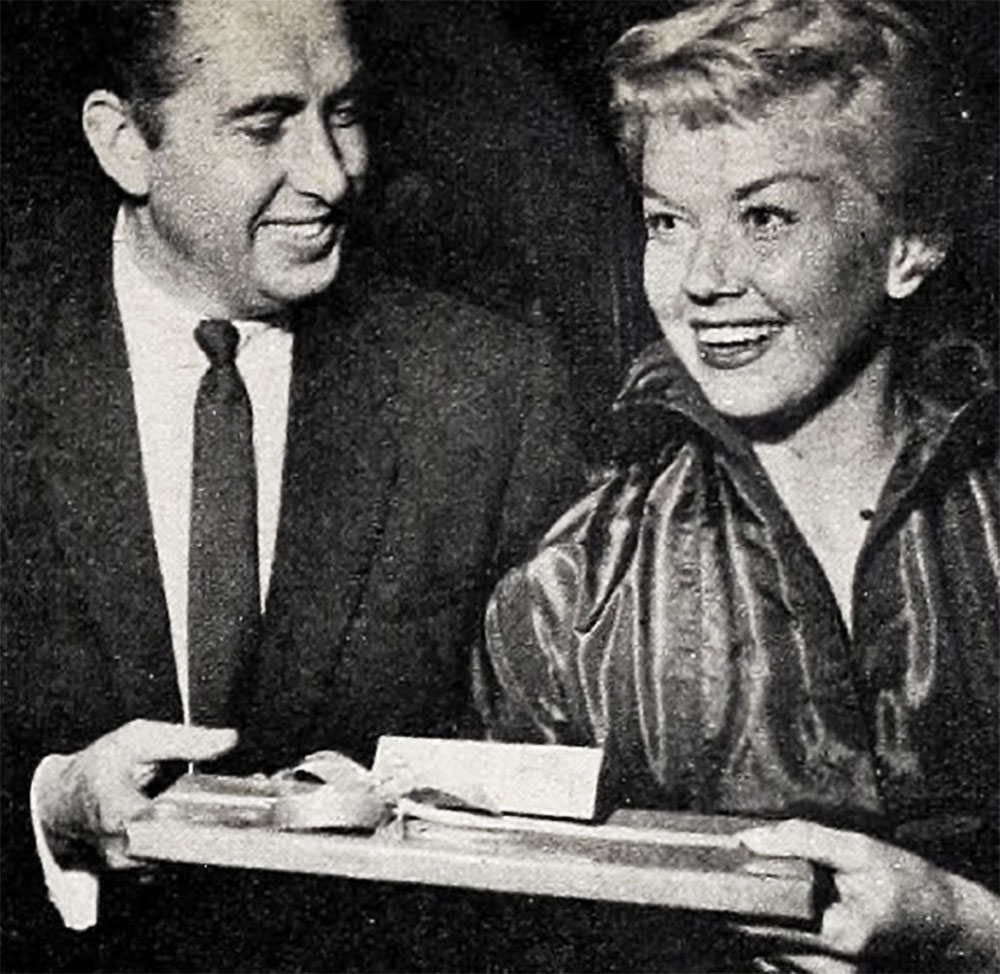
“But what could I do, limping around.”
“You won’t keep on limping. Besides, who will know on radio? Grace Raine can get you a job down at Station WLW. She’s told me so,”
“Oh, Mom, darling, can she do it? Can I do it? Do you really think I can? Just till I get married, of course.”
“Of course, just till you get married,” her mother said.
Being on radio was heaven. Just sheer heaven. It almost didn’t seem right to Dorothy, taking money for doing some thing she loved doing so very much. Just standing there, singing, making believe the room in the radio station was a terrific tropical beach on a terrific, warm moonlight night or maybe a room in a New York penthouse, overlooking the whole city and rain falling against the windows, while she sat all cozy and warm in front of a glowing fireplace with the man of her dreams.
“Why don’t you try making a few records?” her mother said to her after a few months.
“I could, couldn’t I, Mom? Maybe I could send them out to some of those big recording agencies or other stations. Maybe they’d want me for something—just till I get married, of course.”
“Oh, sure,” said her mother. “Just till you get married.”
Dorothy was crazy about all the really big singers. Frankie, Bing, Perry Como, Dinah Shore. She bought all their records, played them constantly, listened to them eternally on radio. But when she got her own finished records, she didn’t have enough nerve to send a pressing to any of them. From some resource within her brain, she got the idea of sending one to Bob Crosby. He just sounded so friendly, and his band was so keen.
Her own pet of what she had recorded was “With the Wind and the Rain in Your Hair.” She sent that one to Bob where he was playing, the Blackhawk in Chicago. Her note said, “I love your band. I’d like to sing with you.”
This was fresh, she knew. She signed the note “Doris Day,” the name Barney Rapp had given her before he’d let her sing a bit with his band. Barney had discovered her right there in Cincinnati, through a song plugger who’d come round to the radio station. She’d sung “Day after Day” for him, and Barney had said she was okay, but her name Kapplehoff had to go. Barney had given her “Day” from the song. Her mom had given her “Doris” from Doris Kenyon, Mom’s movie favorite, and “Doris Day” was then in business.
But Bob Crosby was big time!
Two days later, she got his wire. “Come on up,” it said.
She went. Like the radio show, it was heaven, being the canary with the band, the only girl among a lot of fellows. Of course, most of the fellows were very much married, but still. . .
Fun, too, learning how to dress. Learning how to travel. One-night stands, the fellows in the band said they got to be a bore after a while, like audiences got to be a bore, too. But she hadn’t hit that point yet. It was all a ball to her. Especially since now both her legs were just fine, like her over-all health. Good shaped legs they were, too.
Only Bob wanted to get back to California, off the grind for a while. What would she do when the tour ended? Go back to Cincinnati? The kids she knew there now seemed too young. Her twenties were still a long way off, but she felt so worldly.
Just then, the call from Les Brown—Les Brown and his Band of Renown—reached her. Golly! Les Brown wanted her. Her, Dorothy Kapplehoff. No, no. She, Doris Day. She accepted in a big, fast flash.
She came in to the first morning’s rehearsal call with Les Brown and his Band of Renown and the fellows were all lolling around, just as they did at rehearsals with Bob’s band. “Hi,” they all said to her. all except one. Name of Al Jordan, that one. He had brown eyes, black hair, beautiful teeth and a Ford convertible car. Brother, that was really keen!
It turned out Al didn’t even belong with the band. No, siree, he was really at the top, trombonist with Jimmy Dorsey’s band. He’d just turned up that day with the Brown outfit to do a bit of jamming, if somebody had the urge.
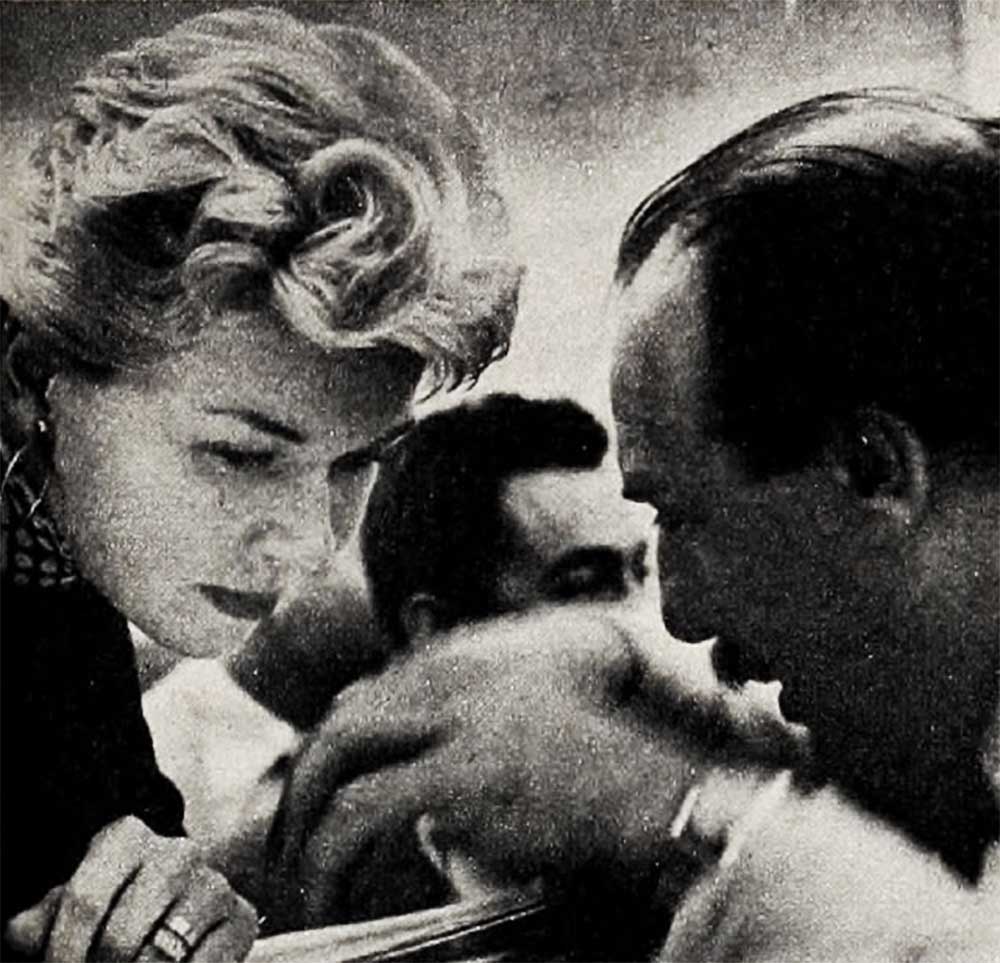
Young Miss Day, very aware of the handsome Mr Jordan, was happily aware that he was happily aware of her. She sang as effortlessly that day as she had sung to the little speckled bird in the tree outside her bedroom window.
Al Jordan said, “You’ve got style, style in your phrasing, style in your dressing and manner of handling yourself. Have dinner with me, will you?”
They had many dinners. They had much talk, vivid, discovery talk, like her finding out he was a musician’s musician, which was the highest praise in their circle The boys in the band all looked up to him, she soon saw. He was an artist. But he told her he looked up to her, as an artist, too.
Life, to young Miss Day, became a Bowl of Cherries. Life was a song, and she was a pretty girl like a melody and he was the only boy in the world. When he did ask her to marry him, she didn’t hesitate for one second.
He did point out to her that he’d have to be on the road. That meant separations. He did point out to her that her recording of “Sentimental Journey,” which she’d made with Les’ band, had made her a big, big star (as well as a big pile of money). He wasn’t so sure that she should give it all up for love.
But she was sure. Love. Marriage. It was all she wanted. She said she wanted to go back to Cincinnati, to be near Mom and her brother Paul. So she got them a house in Cincinnati’s Price Hill section, a wonderful spot, and there she expected she’d settle down with Al and live like a dream forever after.
One trouble with dreams, however, is that they are not worth a darn around a kitchen. Doris couldn’t cook at all. Sometimes to get around this she started dinner at ten in the morning to get it finished by five in the evening.
Another trouble with dreams is that they make loneliness even lonelier. In Doris’, the bride’s, dream world Al was always at her side, adoring her. In fact, this was something quite else again.
She knew it wasn’t his fault. He honestly did have to be on the road to make a living, When he was with her, it was true, that he was constantly adoring, constantly babying her. But she got notions in between times. Were there other girls? Did he really miss her as much as she missed him? Even the romance of his daily special delivery letters (which inevitably arrived at 3 a.m.) and his almost daily wires did not quite soothe her.
Once they quarreled so violently, over what he said were just her notions, that she threw her wedding ring away and said their marriage was over. They hadn’t yet been married so much as a year when that happened. Al went angrily out on the road, and he was no sooner gone that she regretted it. When he came back, he had a second wedding ring with him.
“Will you wear this, darling?” he begged.
She melted with happiness. And it wasn’t too much later that she discovered motherhood was heading her way and her joy knew no bounds. Both she and Al wanted a son, and both of them refused to face the fact that the band business wasn’t what it had been. His one-night stands were further and further distances from one another, further and further apart in so far as earning were concerned.
The baby was a boy, and an angel. She named him Terry, and Al was a very proud father. still the baby didn’t bring the bliss with him all babies are supposed to deliver. This perfect child brought complications with him, the extra feeding, the extra housekeeping, the continual need for extra money.
It just all got to be too much for dreamers, particularly to young dreamers with temperament. Heartsore, disillusioned, they agreed to divorce.
Dorothy-Doris took the baby home to Mom, took herself down to WLW, her old radio station. “Give me a job,” she asked them.
“But you’re a big shot now,” said the station manager. “I couldn’t afford to pay you anything but the straight fee for singing commercials, $64 a week.”
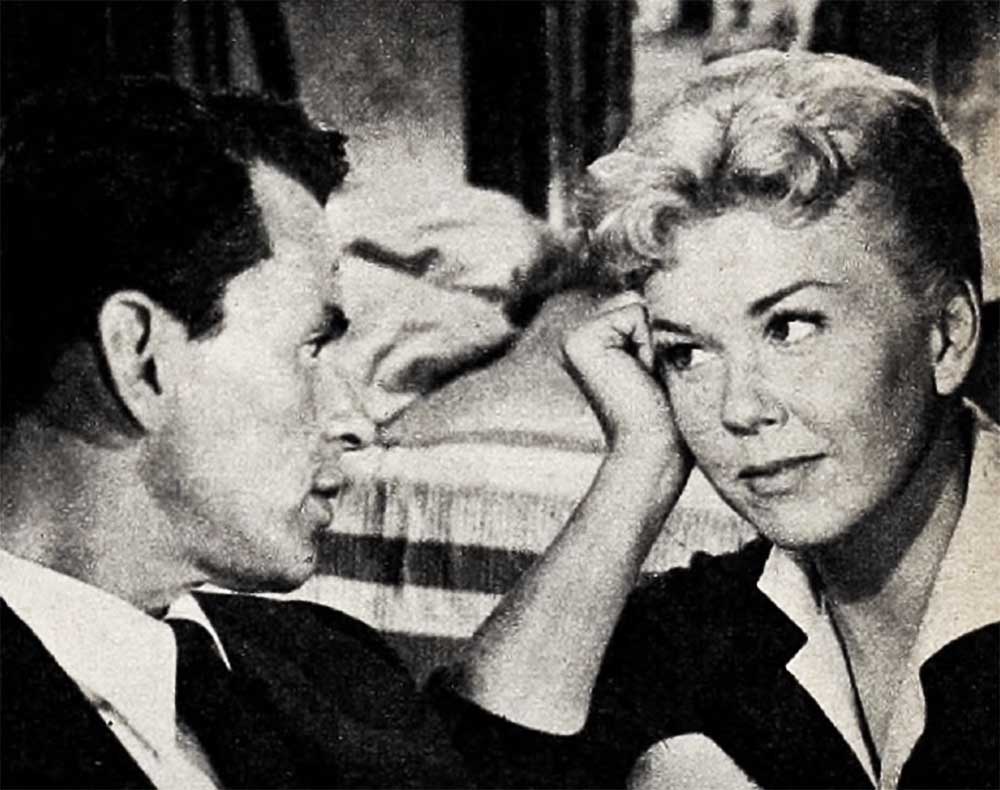
“I can feed my son and me on $64 a week,” she said. “Please hire me.”
One of the first nights she was back on the air she sang the lullaby her mother had sung to her, as a baby, and which she was now singing to her son, “Go to Sleep, My Baby.” The pain of the sobs she was holding back made her throat ache.
For weeks thereafter the offers from bands poured in to her. She had been singing from her heart and her sorrow, and she hadn’t thought of what the result might be. Now she selected from among the offers the Stan Kenton outfit. It meant the road again. It meant leaving her son. But it also meant she could support her son in the manner in which he must be supported in order to be strong and healthy. It meant she could pay Mom’s living costs and her own.
She was twenty-two. Terribly old. She told herself she had no dreams left, no time for dreams. So then she met George Weidler, who was the top saxophone man with Kenton. He was the brother of Virginia Weidler, who had been a kid movie star, and he was a fine musician.
From the moment of their meeting, she loved him utterly. The emotions she had felt for Al paled, like her high school crushes, like the passions she had once known for her dolls.
She and George talked, talked, talked. They created music, they danced, they talked. The moment they got an engagement where they settled down for a solid piece of time, they gave themselves time to get married. The place was Mount Vernon, just outside of New York City, where they were playing.
‘I’m going to give up singing,” Doris told George. “I want to settle down, be a perfect wife and have lots of children.”
“Well, as you know,” said George, ‘there were seven kids in our family, even if Virginia turned out to be the most talented.”
Actually, it seemed that Doris and George had everything in common including their German ancestry. They had both been brought up in a household dedicated to music. They were both the same age. They both wanted the same things. And they were truly in love.
But, again, things weren’t too good in the band business (they seldom are, but young lovers don’t stop to think of such things). “If I could just get to the Coast,” George said, ‘I’m sure things would pick up for me. There’s radio work, picture work, recording work. We wouldn’t be forever dependent on this night-club work.”
“All right, darling,” said his adoring wife.
When they hit Hollywood in 1946 they discovered the housing shortage. They’d left Terry back in Cincinnati until they got settled, but it wasn’t too long before they discovered if they were to have a roof over their heads they had to buy it. They didn’t have the price of a house, but they could afford the swankiest trailer you ever saw, so they got that, and had it towed out to a mighty pretty spot which overlooked the mountains and the sea.
Doris adored it. One thing she’d always been in the housewife division was neat as a pin and this was like a game, keeping such a tiny place up. And she had finally learned how to fry a plate of eggs without ruining them, and to boil coffee and of course there were the frozen things really romping into market, which did save their meals.
Doris trotted about in a state of bliss. George loved funny little cafes in out-of-the-way places, loved catching different acts on the night-club circuit. Because he loved it, she loved it, too. And because his eyes would be seeing them, she loved making curtains for the trailer windows and planting window boxes of flowers for it.
However, George was discovering that on the Coast he wasn’t so much George Weidler, excellent saxophonist, as he was Virginia Weidler’s young brother. He haunted the booking offices, the agency row. Nothing came up.
But because of her records, Doris got many bids. “I’m retired,” she said to one and all. However, when the offer of a ten weeks engagement at New York’s Little Club came up, George told her she was out of her mind if she didn’t take it.
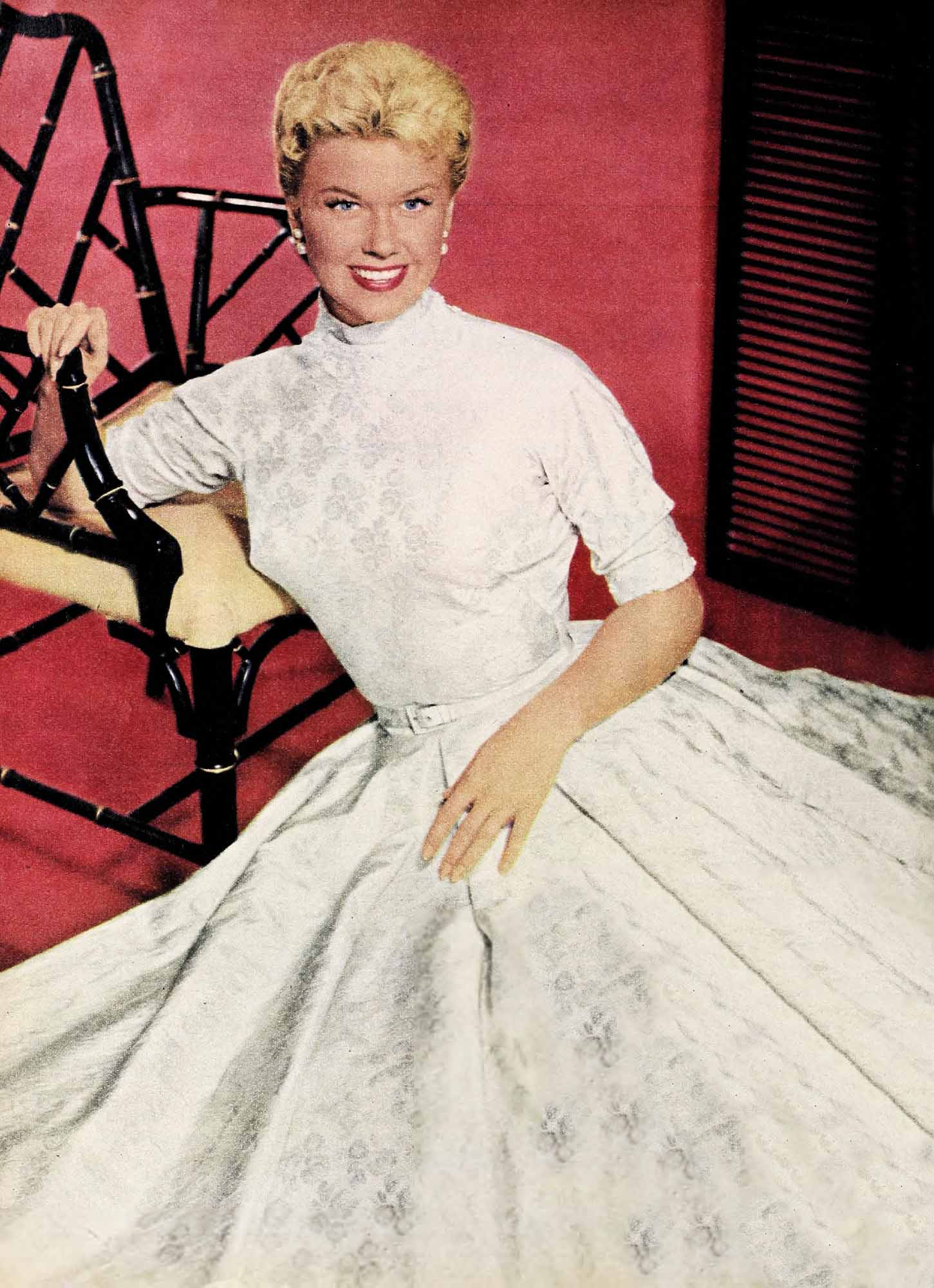
“You’ll come with me if I do?” she asked.
“No, doll. I’ll stay here and still hunt some work.”
“Then I won’t go.”
“You know we need it for eating money.”
So she let him persuade her. It was midwinter and the night she was due to open, it began snowing. She knew that she should be excited. It was actually the swankiest place she’d ever sung, but she simply felt cut off from California, from George, from her baby and Mom in Cincinnati. She waited around her hotel room till the last minute, hoping for the phone to ring, long distance from California, but she excused the fact that it didn’t, saying it was because they didn’t have a phone in the trailer and that George had probably told himself he shouldn’t spend the money.
When she came into the club dressing room, however, she saw the telegram. She pounced on it joyously. While outside, she could hear the band about to go into her intro. Because of the weather, she’d decided she’d open with “Let It Snow, Let It Snow, Let It Snow.” She tore the telegram open.
It was from George, but she couldn’t believe the words. Even months afterward she could not remember them exactly. Only their meaning. Only their terrible meaning.
“Don’t come back,” the words screamed out at her. “Don’t come back. As far as I’m concerned it’s all over. George.”
She knew it had to be some dreadful joke. She knew it had to be one of her old nightmares coming back to her. If she sat quite still, if she did nothing, she told herself, it would go away.
There was a knock on her dressing-room door. “You’re on, Miss Day,” a voice told her. Then, presently, “Miss Day, you’re on. There’s your cue music.”
She went out, and through one of the club windows, she could watch the snow falling. Falling on her heart, she thought. She began to sing, and she shivered, from pain, and the tears began falling down her face. The audience went mad. They thought she was acting.
Her second number was “This Love of Mine.” Now she really cried. The audience adored her.
Somehow she got through all the numbers, and then she was backstage, telephoning, calling Hollywood, calling all the places George might be. Only he wasn’t at any of them.
She went to the management and begged them to let her out of the engagement. But she was too big a hit. They held her to the letter of her contract.
The next day, she tried telephoning again, and wired and wrote. She didn’t reach George. That day or the next or the next or the ones after.
When the impossible ten weeks were up, the management begged her to stay longer. She refused. She had only one thought in mind, to reach the Coast at the earliest possible moment.
Once in Hollywood, she drove straight out to the trailer. There it was, right where she had left it. But the flowers in the flower boxes were all dead from lack of water, and at the open windows, the curtains blew in and out, dirtied by the dust and the rain.
She unlocked the door and went in. George was not there. No one was there. Plainly, no one had been there for weeks and weeks.
She drove back into town, but none of their friends had seen George. No agent knew his whereabouts. She took a room in a small hotel, a very inexpensive hotel, in the center of Hollywood and she started haunting the Boulevard. A dozen times a day she thought she saw him and would turn her head eagerly, her heart beating. Always she was wrong—and disappointed.
Doris knew she had to get work to send money to Mom for her and Terry. Finally, she went in to see her agent, Al Levy.
“Sure I can find you something,” Levy said. “You just sit tight, kid, and I’ll phone you every day and you phone me whenever you feel like it. If I’m not in, you talk to my assistant, Marty Melcher.”
She noticed that Mr. Melcher was attractive. Nothing more.
Al Levy made an appointment for her to see Bob Hope. They waited hours, then Hope said he couldn’t see her. “But she’ll be famous one of these days,” Levy argued. “When she is, bring her around,” Hope said.
Her money ran lower. “Say,” said Levy on the phone to her one morning, “I’ve got an appointment for you to see Mike Curtiz. You know, he’d got that picture ‘Romance on the High Seas’ ready to go, but Betty Hutton can’t do it because she’s going to have a baby.”
Doris felt a stab of jealousy. A happy girl going to have a baby. “But I can’t act,” she said to Levy. “And I’m not pretty enough for pictures, anyhow.”
“Let’s go see,” said Levy. “The guys who wrote the songs asked for you, especially.”
It was like the Hope appointment. They waited hours. Finally the great director, Curtiz, came out. He gave Doris one look. It wasn’t a flattering look. He virtually collapsed when in reply to his question about her dramatic experience, she said all she’d ever done was play a duck in a school play.
“Just listen to her sing, Mike, please,” Levy pleaded.
They put a song in front of her, a new song that was to be in the picture. It was called “That’s Magic.” A love song. They played it through for her once and she loved it immediately. A true love song.
She sang it, and at the end, looked up to see the tears in Curtiz eyes.
“With your kind of heart, you can act,” he said.
She called her mother in Cincinnati the next day, after her screen test. “How’s Terry?” she asked. “How are you? Yes, I’m fine.” it wasn’t until she was almost ready to hang up that she added, “Oh, Mom, I’m signed to a seven-year contract at Warners.”
It was 1947 and everybody was wonderful to her at Warners. She liked the days, but the evenings, the nights were terrible. She still walked Hollywood Boulevard and Vine Street, hoping, searching. Or she sat in her little hotel room and played Perry Como records, especially his “Without a Song” so many times that she wore out four pressings of it.
She was a smash hit in “Romance on the High Seas.” Bob Hope sent for her. “I was crazy,” he said. “Now look what I have to pay for you.” She was made a regular part of his radio show. She made a recording of “It’s Magic.” It sold a million copies.
She was big business. More and more she had to transact things with Levy. More and more Marty Melcher had to handle details for her. She liked and respected him very much and realized never before had she had a male friend. She figured he understood about girl singers because he was married to one, Patti Andrews.
Her income began climbing, a thousand a week, two thousand a week. Her second picture was a smash, too. She said to Warners, “I’d like to make family pictures. About families. Stories about marriages, happy marriages.”
Mom was living with her now in a little house not too far from the studio, and Doris was going through the crazy situation of persuading her six-year-old son that she really was his mother. Crazy-wonderful situation, because he was the most all-boy small boy she had ever seen.
Almost a year and a half had gone by since her Little Club engagement when Doris Day, now the very famous star, saw George Weidler coming down the Street toward her. As their eyes met, he smiled and held out his hand to her. Because she had dreamed of this moment so long, and had so long given it up for lost, she couldn’t think of what to say.
“Let’s go get a drink,” she said, inadequately.
His eyes were warm and friendly. “I’ll buy you one, Dodo,” he said. “But I don’t drink any more. Nor smoke, either, for that matter.”
He had never been much of a drinking man, any more than she was much of a drinking girl. But still!
“What happened? What’s happened to you? You look so—well—contented.”
“I am,” he said. “Don’t laugh. What happened to me was religion.”
They found a restaurant, and over coffee, he told her all about it. It was Christian Science that had brought him such peace of mind. Yes, he knew of her success, and he was very proud of her, and he reminded her that he had always predicted it for her.
They talked for hours, but when they parted, Doris knew it was all over. Perhaps the source that had brought him such peace would bring it to her, too, eventually.
So now her life took on a new dimension, work during the week, Mom and Terry during the evenings, church on Sunday. And once in a while, and gradually twice in a while, and after a bit, three times in a while, she and Marty Melcher would consult about business matters in the evening. Finally one night, at dinner at her house, she said, “I don’t think you really come here on business matters. I know you don’t come to see me, as myself. You just come for Mom’s cooking.”
She was joking, of course, and he smiled at her, but for the first time Marty did talk, then, about himself. She had known for months that his marriage was only a technical one. He lived alone, but like her, he had not sought a divorce.
But now he began talking about himself as a little boy from North Adams, Massachusetts, who had never known his father. Who had gone to work at the age of ten. Who loved people and show business and personalities—and yet . . .
“And yet,” said Marty Melcher, “I’ve never been able to discover the girl—anyone, for that matter—who wanted to live the kind of simple life I want.”
“What kind of a life is that, Marty?”
“Oh, a perfectly simple house, on a perfectly simple Street. An early-to-rise, early-to-bed existence. You see, Doris, I’ve had so much of night clubs, as my business, I don’t want any part of them as entertainment. During the day I have to meet so many people, phone so many others, I’d like at evening to find a girl who would be content just to be home, watch TV, maybe, or something equally relaxed. But that’s selfish of me. No girl who has been cooped up home all day wants to stay put in the evening, too.” “What about a working girl?”
“What kind of a working girl would understand show business?” Marty asked. “The crazy hours. The crazy demand. I guess I’m stuck with being a semi-detached man, and I don’t like it, not at all.”
It came back to Doris, again and again, that talk, long after the evening she and Marty had had it. She wasn’t in love with him. This she assured herself. She wasn’t crazy for him as she had been for Al, nor devastatingly overwhelmed as she had been by George.
He was her friend. Her good, good, intelligent friend. But he was good-looking, and he gave her all the small courtesies she had never received from any other man. Foolish things, but delightful, like always pulling out chairs for her, holding doors for her, looking around to be sure she had remembered her gloves, little important things.
Besides, Terry thought he was the greatest. Terry was openly matchmaking, while Marty played volleyball with him or helped him fix up a badminton court or swam with him in the near-by pool.
One day she told Marty she thought she should buy a house. He agreed. “I’d like to go hunt one with you, when you start out on it,” he said.
She found it, finally, a house on a dead-end street in the Valley, where it would be safe for Terry to play, where there was room for a pool, where it was quiet as a country lane, yet near the studio, too. She’d be able to go to the studio in jeans from there and nobody would be the wiser.
It was the house that Marty liked best of all they had seen, too. She said, innocently, “Oh, Marty, I’d just love to live here. Wouldn’t you?” Then her heart missed a beat for she saw the way his eyes were looking at her, wide-open, begging, and nothing hidden in their depths.
They became engaged, as simply as that, and suddenly everything in life became more beautiful than she had known anything ever could be. True, they each had to get their divorces, but there was no strain between them. There was no rush, no lying, no fear. They were each other’s best friend, and presently they would be man and wife.
She had her divorce by June of 1950, but they had to wait until February of ’51 for Marty’s to be final. In that interval they shopped for things for their house. Little things. Little things like window curtains, like a plain rug that a husky young boy could swarm on and not harm, things to make into planters. Simple things, but Doris loved the shopping and so did Marty. And they talked of going to New Orleans on a honeymoon.
But when the spring of ’51 finally did get there, and Terry was writing his name “Terry Melcher” experimentally and calling Marty, “my intended father,” New Orleans seemed very far away from the house that would be theirs.
Doris’ birthday was approaching, the third of April. “That’s as good a time as any to be married,” she said, so with her brother Paul and his wife standing by as their attendants, she and Marty were married, with complete simplicity in the little town of Burbank. Even as they drove over for the ceremony, Doris saw some curtain material she wanted in a shop window and they stopped and bought it.
They came back for a meal with Mom. “What a beautiful package deal I got,” Marty said. “You, Mom, Terry and Doris.” They were in their house at last.
“Well, you certainly must go somewhere on your honeymoon,” said Mom. “You just must. You’ll have years to live in this house.”
“Oh, gee, must they?” said Terry.
“I guess we really should,” said Marty.
So he and Doris headed out for Phoenix, only they got lost, and ended in the tiny town of El Centro, California. They couldn’t get a room except in a motel. The temperature was 94 degrees and Marty’s long legs dangled way beyond the length of the bed.
Next day they set out for Grand Canyon. To Marty’s horror, Doris couldn’t remember whether on any of her one-night stands she’d ever been there. So she came up to the rim of the world’s greatest view, said, “Nope, never saw it before. Marty, let’s go home.”
“Forever,” said Marty—and they did.
THE END
It is a quote. PHOTOPLAY MAGAZINE JUNE 1955




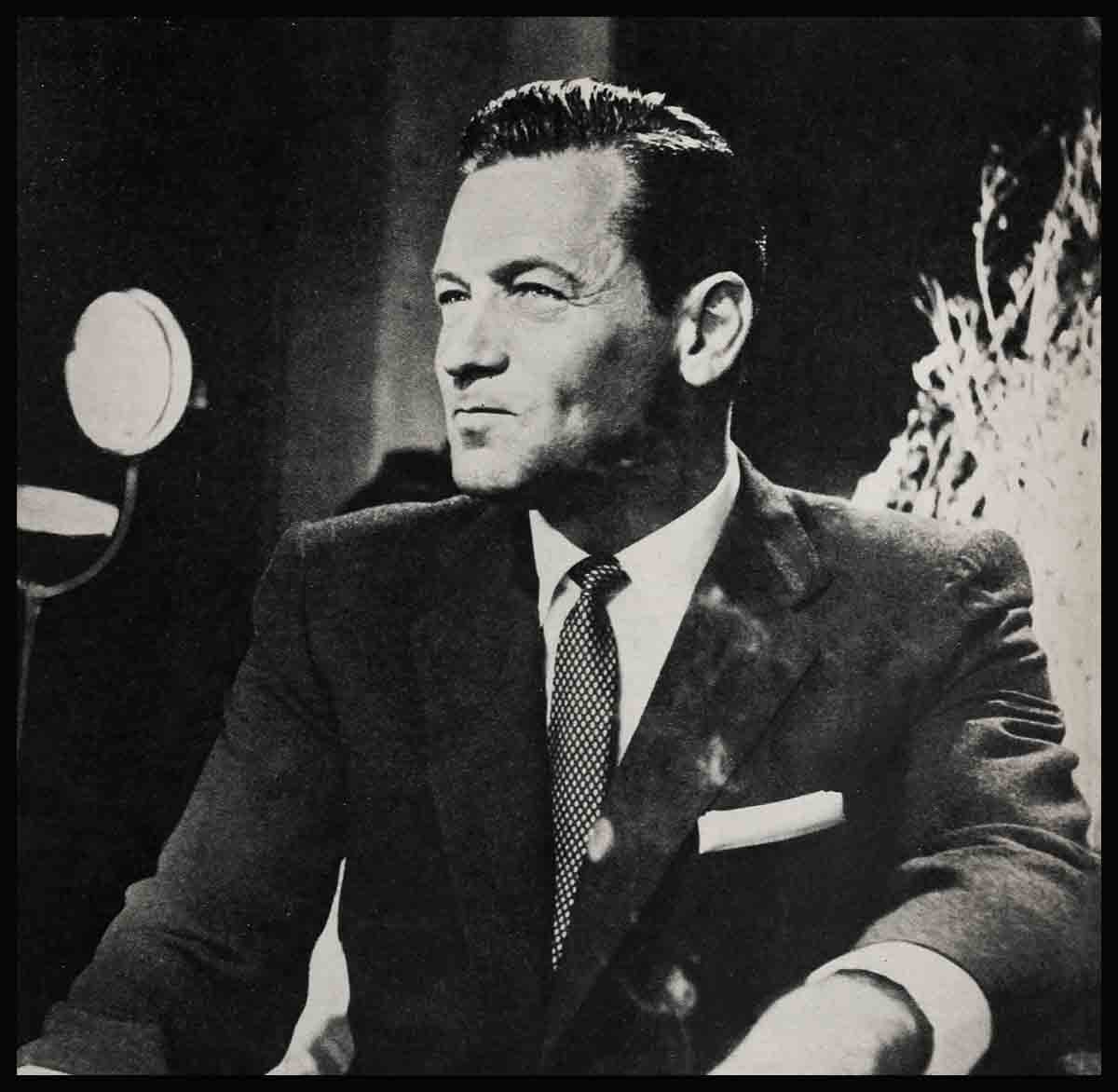
No Comments